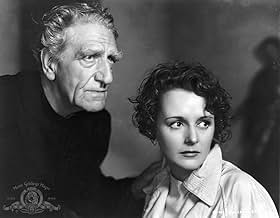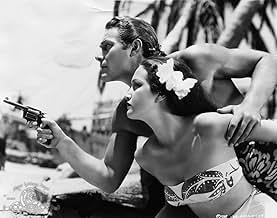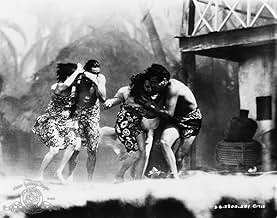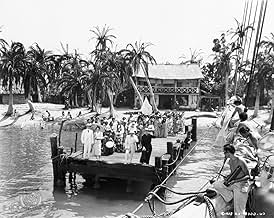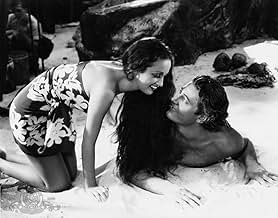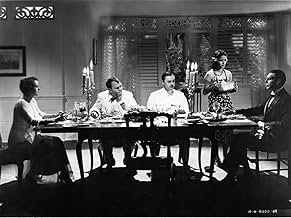IMDb RATING
7.1/10
3.2K
YOUR RATING
A Polynesian sailor unjustly imprisoned after defending himself against a colonial bully is relentlessly persecuted by his island's martinet French governor.A Polynesian sailor unjustly imprisoned after defending himself against a colonial bully is relentlessly persecuted by his island's martinet French governor.A Polynesian sailor unjustly imprisoned after defending himself against a colonial bully is relentlessly persecuted by his island's martinet French governor.
- Won 1 Oscar
- 3 wins & 2 nominations total
Lionel Braham
- The Governor
- (uncredited)
John Casey
- Native
- (uncredited)
Spencer Charters
- Judge
- (uncredited)
Anne Chevalier
- Reri
- (uncredited)
Featured reviews
The Hurricane is a terrific but overlooked film from 1937, often thought of as a tepid "island romance," but in actuality a solid dramatic film (directed by John Ford) with great special effects and music by Alfred Newman.
Dorothy Lamour and Jon Hall play the leads, Pacific Islanders who get caught in French provincial law and governance, as applied by strict governor Raymond Massey. Despite sympathetic tendencies of others Hall is convicted of striking a white man and imprisoned in Tahiti-600 miles away. He escapes in time for the "big blow" that seems to his the island in retaliation for the white man's laws.
Lamour is quite good as the island beauty, and Hall brings more to his role than the usual "hunk" attitudes and poses. Massey is solid as the taciturn governor who finally sees the light. Mary Astor is good as always as the governor's wife. Thomas Mitchell is the drunken doctor. Jerome Cowan is the ship captain. John Carradine is the sadistic guard. Spencer Charters is the inept judge. Inez Courtney is the girl on the ship. And best of all is the regal C. Aubrey Smith as the island priest.
The hurricane is awesome and the special effects among the best of the decade. The scenes of Astor crawling along a rope to find refuge in a tree and windblown Smith playing the organ as the church roof blows away are great. The destruction of the island is totally convincing and becomes almost mythic as a natural force to wipe out man's inhumanity.
Great film and very underrated.
Dorothy Lamour and Jon Hall play the leads, Pacific Islanders who get caught in French provincial law and governance, as applied by strict governor Raymond Massey. Despite sympathetic tendencies of others Hall is convicted of striking a white man and imprisoned in Tahiti-600 miles away. He escapes in time for the "big blow" that seems to his the island in retaliation for the white man's laws.
Lamour is quite good as the island beauty, and Hall brings more to his role than the usual "hunk" attitudes and poses. Massey is solid as the taciturn governor who finally sees the light. Mary Astor is good as always as the governor's wife. Thomas Mitchell is the drunken doctor. Jerome Cowan is the ship captain. John Carradine is the sadistic guard. Spencer Charters is the inept judge. Inez Courtney is the girl on the ship. And best of all is the regal C. Aubrey Smith as the island priest.
The hurricane is awesome and the special effects among the best of the decade. The scenes of Astor crawling along a rope to find refuge in a tree and windblown Smith playing the organ as the church roof blows away are great. The destruction of the island is totally convincing and becomes almost mythic as a natural force to wipe out man's inhumanity.
Great film and very underrated.
Some parts are terribly corny with dialog handed to the actors in the form of declamations but overall a well directed and enjoyable film. The picture doesn't require any heavy lifting dramatically but Hall is fine in the lead, certainly a dashing protagonist and Dorothy of course looks great in her sarong. It's the supporting cast, a collection of dynamite character actors, that make this memorable. Any movie lucky enough to have Mary Astor, Thomas Mitchell, Jerome Cowan, Raymond Massey and John Carradine contributing their individual presence is worth seeing if only for them but this has good special effects, for the time, and a fun story to boot.
Jon Hall, Dorothy Lamour and an excellent cast are all caught in "The Hurricane," a 1937 film and the first to win a Special Effects Oscar. The original novel was written by Jon Hall's uncle.
On the island of Manakoora, Terangi (Hall) and Marama (Lamour) marry amidst a happy celebration, though their happiness will be short-lived. Terangi must deliver cargo to Tahiti, though Marama has a premonition about the trip and warns him not to go.
While in Tahiti, he gets into a barroom fight and is sentenced to 6 months in prison. The governor of Manakoora, DeLaage (Raymond Massey), despite the urgings of his friends and his wife (Mary Astor) refuses to ask for Terangi to be brought back to Manakoora and put on parole.
Unable to endure a life with no freedom, and desperate to get back home, Terangi continually attempts to escape. Each time he does, 2 years are added to his sentence until he has to serve 16 years.
At last, Terangi escapes and makes his way back to his island, where he meets his daughter for the first time. Knowing that DeLaage will capture him and return him to Tahiti, islanders prepare to help the family sail to another island. But a hurricane (actually a typhoon) strikes.
Besides those mentioned, "The Hurricane" also stars Thomas Mitchell as the French doctor on Manakoora, C. Aubrey Smith as the local priest, Jerome Cowan as Terangi's captain, and John Carradine as a sadistic prison guard.
The effects are astounding and are a no-miss, particularly considering it is 1937! The tremendous winds, the rising waters, the trees falling, buildings collapsing - all magnificent.
John Ford did an excellent job of directing this film, which has racism as its underpinning - the prison sentence was the result of a so-called dark man hitting a white man; and DeLaage's patrician and cruel attitude has racism at the base of it
I disagree with one of the comments that states that Hall was a white-skinned movie star trying to pass himself off as a dark man; Hall's mother was Tahitian.
Dorothy Lamour, exotic and beautiful, has very little to do in this film except look frightened and lovely - you can count her lines on one hand.
Hall, a total hunk if there ever was one, has more to say and do but one is so distracted by his face and physique that it becomes difficult to pay attention to anything else. The acting burden falls to Mitchell, Massey, Astor, Carradine, and Cowan, who are terrific.
Ford isn't known for his tales of the sea, but obviously he was good at everything. He wouldn't see water again until the 1950s. Lamour carried on the sarong tradition in better roles, and Hall worked into the mid-'60s; at the age of 65, dying of cancer and in excruciating pain, he shot himself.
Highly recommended as a feast of skin and brilliant special effects.
On the island of Manakoora, Terangi (Hall) and Marama (Lamour) marry amidst a happy celebration, though their happiness will be short-lived. Terangi must deliver cargo to Tahiti, though Marama has a premonition about the trip and warns him not to go.
While in Tahiti, he gets into a barroom fight and is sentenced to 6 months in prison. The governor of Manakoora, DeLaage (Raymond Massey), despite the urgings of his friends and his wife (Mary Astor) refuses to ask for Terangi to be brought back to Manakoora and put on parole.
Unable to endure a life with no freedom, and desperate to get back home, Terangi continually attempts to escape. Each time he does, 2 years are added to his sentence until he has to serve 16 years.
At last, Terangi escapes and makes his way back to his island, where he meets his daughter for the first time. Knowing that DeLaage will capture him and return him to Tahiti, islanders prepare to help the family sail to another island. But a hurricane (actually a typhoon) strikes.
Besides those mentioned, "The Hurricane" also stars Thomas Mitchell as the French doctor on Manakoora, C. Aubrey Smith as the local priest, Jerome Cowan as Terangi's captain, and John Carradine as a sadistic prison guard.
The effects are astounding and are a no-miss, particularly considering it is 1937! The tremendous winds, the rising waters, the trees falling, buildings collapsing - all magnificent.
John Ford did an excellent job of directing this film, which has racism as its underpinning - the prison sentence was the result of a so-called dark man hitting a white man; and DeLaage's patrician and cruel attitude has racism at the base of it
I disagree with one of the comments that states that Hall was a white-skinned movie star trying to pass himself off as a dark man; Hall's mother was Tahitian.
Dorothy Lamour, exotic and beautiful, has very little to do in this film except look frightened and lovely - you can count her lines on one hand.
Hall, a total hunk if there ever was one, has more to say and do but one is so distracted by his face and physique that it becomes difficult to pay attention to anything else. The acting burden falls to Mitchell, Massey, Astor, Carradine, and Cowan, who are terrific.
Ford isn't known for his tales of the sea, but obviously he was good at everything. He wouldn't see water again until the 1950s. Lamour carried on the sarong tradition in better roles, and Hall worked into the mid-'60s; at the age of 65, dying of cancer and in excruciating pain, he shot himself.
Highly recommended as a feast of skin and brilliant special effects.
The South Seas island of Manikoora is alive with happiness on the day of the wedding of Terangi and Marama. Terangi has his honeymoon cut short, when he has to sail to deliver cargo to Tahiti. Terangi's visit to Tahiti becomes hell when he slugs a man in a barroom brawl and is unjustly sentenced to six months in prison mainly because he as a native islander hit a white man. Terangi repeatedly tries to escape and is caught each time, only to add more years to his sentence. Back on Manikoora, Governor De Laage makes no effort to release Terangi because in his mind Terangi is a law breaker and deserves to be punished, despite the words of his wife, priest, and island doctor to the otherwise. One night Terangi does manage to escape, even though he unknowingly knocks a guard to the ground, killing him. Father Paul rescues Terangi from the sea and arranges to meet Marama and their daughter Tita. When De Laage learns that Terangi is back on the island, he makes a determined effort to apprehend him, not realizing one of the most devastating hurricanes is coming to strike, which may destroy the whole island. A very good movie. I was expecting much footage of hurricane destruction, I didn't realize the plot aspect of the prison, which was a lot more than plot filler. Hall and Lamour were good, even though I enjoyed their movies from the 40's a lot better. Massey gives one of the best performances of his long career as De Laage, as a heartless and sadistic fellow. The special effects are amazing, even by 2004 standards. Beautiful on-location photography as well. Rating, 9.
The story line of this movie gets a bit fanciful at times, but it doesn't get out of hand and the movie does not pretend to be anything it isn't, so I think most people well enjoy it.
There are several fine performances. My favorite is that of Raymond Massey as he is very convincing in the thankless role of a cold-hearted governer who towards the end shows a sadistic side and then, at the very end of the movie, shows that there is good in everybody.
Then there is the hurricane itself. Naturally I have not seen every movie ever made, but seeing how this movie predates the computer age the hurricane is surely the greatest special effects in movie history.
There are several fine performances. My favorite is that of Raymond Massey as he is very convincing in the thankless role of a cold-hearted governer who towards the end shows a sadistic side and then, at the very end of the movie, shows that there is good in everybody.
Then there is the hurricane itself. Naturally I have not seen every movie ever made, but seeing how this movie predates the computer age the hurricane is surely the greatest special effects in movie history.
Did you know
- TriviaAccording to Life Magazine, special effects wizard James Basevi was given a budget of $400,000 to create his effects. He spent $150,000 to build a native village with a lagoon 200 yards long, and then spent $250,000 destroying it.
- GoofsAs the the hurricane bears down on the church with its flooding fury, some of the native islanders choose to escape the failing structure by making their way out clinging to a tied off rope. As one of the huge waves hits the rope, a couple of the women islanders get flipped over and appear to be drowning. During the flip, one of the women's sarong top gets pulled down from the special effects wave and for a split second there is a bare breast exposure which the censors didn't catch.
- Quotes
DeLaage: You helped Terangi? My own priest?
Father Paul: I'm his priest too!
DeLaage: You helped a murderer!
Father Paul: I aided a man whose heart is innocent.
DeLaage: You've given aid to anarchy and bloodshed!
Father Paul: I'll answer for it.
- ConnectionsFeatured in Movies Are Adventure (1948)
- How long is The Hurricane?Powered by Alexa
Details
Box office
- Budget
- $2,000,000 (estimated)
- Runtime1 hour 44 minutes
- Color
- Aspect ratio
- 1.37 : 1
Contribute to this page
Suggest an edit or add missing content




